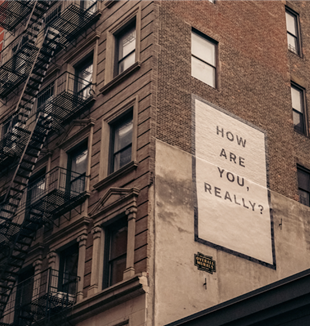
When Things Get Real
Erin reflects on her journey of faith in light of the work we are doing on The Religious Sense.I was recently talking to my fiancé about a phenomenon that I have experienced and like to call late-onset anxiety. As a counselor, I am well acquainted with anxiety, and what I find most often is that either you experience anxiety from a very early age or something distinct happens in adulthood to make you more anxious, say a car accident or an abusive relationship. But what I was talking about is neither of these things. About 4-5 years ago, I began to experience anxiety for the first time, seemingly out of the blue. Of course, I had been stressed or overwhelmed from time to time prior to this, but something changed significantly around this time in my life. All of a sudden I became an anxious person. Whether it was over simple things like all my nephews being accounted for at a family outing or about bigger questions such as how to deal with the death of my grandparents, I felt anxious in the face of these things.
Widening my scope a little bit, I can recognize that there were other significant changes in my life around this time as well. I began to curse more often, particularly in regard to my work. I would often become so passionate about my work in foster care that I found myself using more expletives than I ever had in my life. I was always a well-manner child and never had much of an affinity for fitting in, so cursing was not in my repertoire prior to this. I also began to cry a lot (or what seemed like a lot). Growing up I remember crying very, very rarely. In fact, I could probably count the number of times on one hand. But something broke open in me and I would be moved to tears when I thought of my grandma, listened to a beautiful song, or got frustrated with a friend.
Reflecting on this shift inside of me, I think that what on the surface may seem like concerning things – anxiety, profanity, crying, were really a sign of new life! A sign of me taking life seriously, of feeling the heaviness of life for the first time. I don't think that it is a coincidence that this is also around the time that I met the movement – a movement that asks me to take everything seriously, to face reality head-on because that is where Christ is supposedly waiting to meet me. My life was surely not easier this way, but I can say that it was better.
In the past 5 years, I have felt more anxious, sad, infuriated, passionate, scared, accompanied and loved than ever before. Giussani proposes in The Religious Sense that feelings are an integral part to knowing. While we are often pushed, whether by society or our families of origin, to shove down our feelings or, inversely, to act on their every whim, Giussani proposes something different. Feelings are a part of an equation designed by God. We can accept them, put them in their proper place, and use them as a lens for making judgments on life and judgments on who Christ is. This equation would not have made a lot of sense to me 5 years ago when my feelings seemed few and far between. But now, the equation makes sense. Now I desire to face life because the proposal is that Christ is in it – in all of the good and the bad, the comfortable and uncomfortable, the lightness and heaviness. And when I face life in this way, when I am attentive to all that is around me, there seems to be no shortage of feelings to follow.
Erin, Tampa, FL